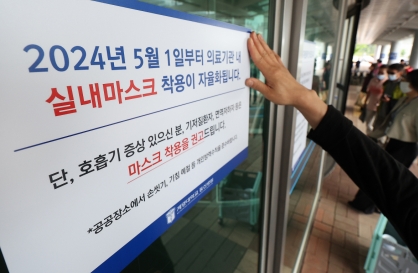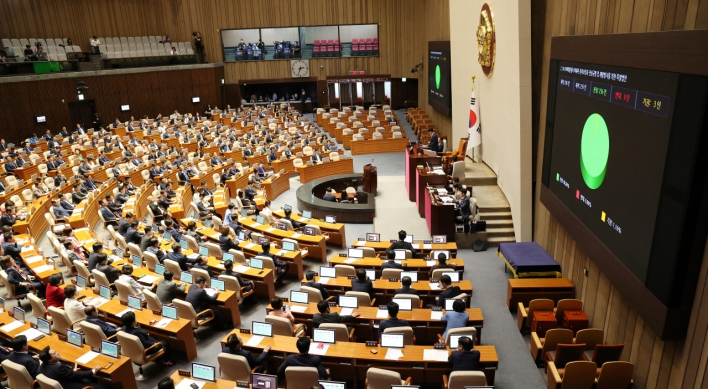GSK, Pfizer slim down to stave of challenges
Lack of R&D, poor business climate force multinationals to restructure
By 윤민식Published : Dec. 17, 2012 - 16:17
Top-ranking pharmaceutical companies in Korea are expected to prune their workforces in the face of challenges both at home and abroad including sluggish economic conditions and a number of deep-seated shortcomings that are finally being addressed.
GlaxoSmithKline, the largest pharmaceutical company in Korea in terms of sales, is planning to hand out early retirement packages to up to 100 employees — more than 10 percent of its workforce of 750 — before the year is over. The firm is currently receiving applications.
Pfizer, the country’s top seller of prescription medicine, is also planning to trim down in size, the first such restructuring since it first entered the local market in 1969.
Others, such as Bayer Korea, have already undergone personnel streamlining this year, while Janssen Korea, Sanofi-Aventis Korea and Astrazeneca Korea are reportedly pursuing regular restructuring.
Many of the smaller multinational companies are likely to follow in their footsteps, industry watchers said, mostly in the form of frequent restructuring.
The unions, for one, are noticing these plans and some, such as BMS Korea, have been raising issues with the management.
Sluggish R&D and core competence
The reason behind such unprecedented restructuring is not only unfavorable business conditions, which do play a role, experts say, but also the gradual aging of the global population that is prompting governments to push down medicine prices.
As of April this year, up to 13,800 types of medicine saw their prices slashed by 14 percent. The cut was steeper for about 6,500 types of prescription medicine.
Companies are definitely feeling the impact, but more importantly, the restructuring was inevitable due to the lack of willingness on the industry’s part for self-betterment, says Moon Hye-sun, a research fellow at the Korea Institute for Industrial Economics and Trade.
“Pharmaceutical firms have been far from working on improving their core competence through research and development. They have not been investing enough in product development,” she added.
While medicine makers in the past had no real incentive to reform as there were enough kickbacks to go around, the market has truly become competitive, Moon observed.
In other words, the industry is facing its first real moment of truth, and it’s either reform or die.
The companies appeared to share the opinion.
“The global and local management environment is changing, and we need to change with it,” said Yang Su-jin, a spokeswoman for GSK. The decision for this change, she added, was part of the company’s global management strategies.
Pyo Ji-hyun, a spokeswoman for Pfizer, said that there were certain changes and challenges in the global medicine industry that called for the company to adapt along with them.
Pfizer, so far, had been faring pretty well, industry watchers said, thanks to a wide-ranging global portfolio that includes Viagra, the erectile dysfunction treatment that catapulted the company to fame.
Coping with generic and biosimilar medicines
However, the heyday for some of the most popular medicine may be over because patent protection expires over time.
As this happens, biosimilar and generic medicine, which differ slightly in terms of patent matters but can both be less-pricey alternatives to the original, are flying off the shelves.
One example is Viagra. Between January and April, before its patent expired in May this year, Pfizer’s Viagra had shown average monthly sales of 2.1 billion won ($2 million). But in September, monthly Viagra sales were more than halved to 910 million won, according to market research company IMS Health.
“Generics and biosimilar medicine are all here to stay, and the companies must adapt accordingly,” said Moon. “The restructuring we are currently witnessing is a critical step in the right direction, and the firms that are left standing in the aftermath will lead the markets to become healthier and sounder.”
Experts expect the industry to eventually become more specialized according to the different fields culminating in the form of each company cultivating their own, indigenous field of core competence.
By Kim Ji-hyun
(jemmie@heraldcorp.com)
<관련 한글 기사>
화이자, GSK에서 인원 감축 시작
대표적인 다국적 제약회사인 화이자와 GSK가 인원 감원에 들어갔다.
화이자의 경우, 아직 규모나 시기를 확정하지 않았지만, 이미 지난 주부터 노 사간협의가 시작됐다. 화이자는 현재 전문의약품 매출로 국내 1위를 달리고 있는 제약회사다.
일반의약품 매출 1위인 GSK의 경우, 7월에 이어 또 다시 감원을 계획하고 있다. 규모는 약 100명 정도 예상하고 있으며, 전체 750명 정도의 회사 규모를 감안할 때, 적지 않은 숫자다. 감원 형태는 희망퇴직이며, 연내에는 마무리될 것으로 보인다.
GSK관계자에 의하면, 올해 7월에 이은 두 번째 구조조정이지만, 상반기 목적이 조직쾌적화였다면, 이번에는 글로벌 본사의 전략에 따른 것이라고 했다.
세계적인 다국적 제약회사들이 이 같은 구조조정의 길을 걷게 된 데에는 경기불황을 포함한 업계의 자체적인 이유도 포함되어 있다고 전문가들은 말한다.
“전세계적으로 고령화로 인해 복지비용 증가하고 있어, 그에 따라 악가인하도 전세계적인 추이로 자리잡고 있다. 게다가 우리나라는 제약산업이 영세하고, 투자도 연구개발 역량도 미미한 편이었다”라고 산업연구원의 문혜선 박사가 지적했다.
문박사는 또, 힘든 상황이 당분간 계속되겠지만, 살아남은 기업은 점점 더 건강해지는 방향으로 역량을 구출할 것으로 내다보았다. (코리아헤럴드)





![[Music in drama] Rekindle a love that slipped through your fingers](http://res.heraldm.com/phpwas/restmb_idxmake.php?idx=644&simg=/content/image/2024/05/01/20240501050484_0.jpg&u=20240501151646)

![[New faces of Assembly] Architect behind ‘audacious initiative’ believes in denuclearized North Korea](http://res.heraldm.com/phpwas/restmb_idxmake.php?idx=644&simg=/content/image/2024/05/01/20240501050627_0.jpg&u=20240502093000)


![[KH Explains] Will alternative trading platform shake up Korean stock market?](http://res.heraldm.com/phpwas/restmb_idxmake.php?idx=644&simg=/content/image/2024/05/01/20240501050557_0.jpg&u=20240501161906)








